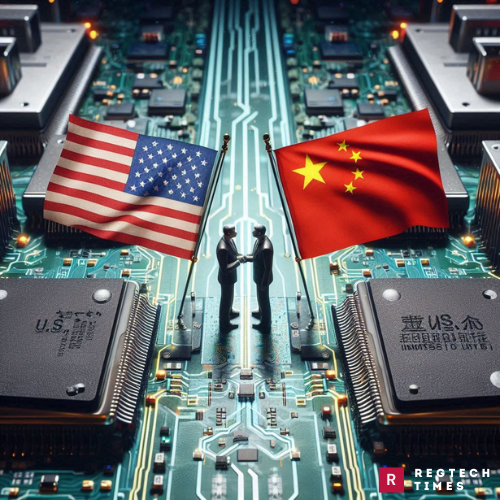In a decisive legal action, Advanced Micro-Fabrication Equipment Inc. (AMEC), one of China’s leading semiconductor equipment manufacturers, has filed a lawsuit against the U.S. Department of Defense (DoD). The company seeks to overturn its inclusion on the Pentagon’s Section 1260H blacklist, which links certain firms to the Chinese military, thereby imposing severe restrictions on their ability to conduct business with American companies. AMEC’s case is emblematic of the escalating tensions between the U.S. and China over technological supremacy, especially in the crucial semiconductor sector.
The Blacklist and Its Implications
The U.S. government has been increasingly wary of China’s “military-civil fusion” strategy, which it views as a means for civilian companies to aid the People’s Liberation Army (PLA) in ways that could pose a threat to national security. Under this strategy, civilian entities are believed to be mobilized to support military objectives, blurring the lines between commercial and military applications of technology. As part of its efforts to mitigate this perceived risk, the DoD has added several Chinese firms to the Section 1260H blacklist. This list includes companies that the U.S. government suspects of having direct or indirect connections to the Chinese military.
For companies like AMEC, being placed on this list is a significant blow. It not only tarnishes their reputation but also bars them from engaging with U.S. firms, which are often crucial partners in the global semiconductor supply chain. For AMEC, this restriction could hinder its ability to compete in the international market, where collaboration with U.S. tech giants like Applied Materials and Lam Research is essential.
AMEC’s Legal Battle
Advanced Micro-Fabrication Equipment Inc.’s lawsuit challenges the Pentagon’s decision, arguing that the designation is baseless and has caused undue harm to the company’s business and reputation. According to AMEC, the DoD’s justification for blacklisting the company is flimsy at best. The Pentagon cited evidence such as an award from China’s Ministry of Industry and Information Technology, which AMEC contends does not establish any direct link to the PLA.
In its complaint, AMEC emphasized its leadership’s strong ties to the United States. Gerald Yin, the company’s founder and chairman, holds a doctorate from UCLA and has previously worked for major U.S. companies like Intel Corp., Applied Materials, and Lam Research. AMEC’s leadership team is predominantly American, a fact that the company hopes will bolster its argument that it is not aligned with the Chinese military.
Strategic Importance of AMEC
Advanced Micro-Fabrication Equipment Inc. is a key player in the global semiconductor industry, producing equipment that is essential for manufacturing advanced chips. The company competes with some of the biggest names in the industry, including U.S. firms Applied Materials and Lam Research. AMEC’s technology is used to produce chips as small as 5 nanometers, which are only one generation behind the most advanced semiconductors currently available.
Hong Kong is Key Link in Illicit Semiconductor Flows to Russia Amidst Growing US Sanctions
The importance of AMEC’s role in the semiconductor industry cannot be overstated. Semiconductors are the backbone of modern electronics, powering everything from smartphones to military systems. As such, the ability to produce cutting-edge chips is not only a commercial advantage but also a strategic one. For China, having companies like AMEC succeed is a critical component of its broader ambitions to lead in global technology and reduce its dependence on foreign technology.
Broader Implications
AMEC’s legal challenge is part of a broader trend of Chinese companies pushing back against U.S. sanctions and restrictions. Earlier this year, Hesai Technology Co., a Chinese LIDAR-maker, also sued the Pentagon over its inclusion on the blacklist. Similarly, in 2021, Chinese smartphone giant Xiaomi Corp. successfully challenged its designation, leading to its removal from the list after a U.S. court sided with the company.
The outcome of AMEC’s lawsuit could have far-reaching implications, not only for the company itself but also for other Chinese firms facing similar sanctions. A victory for AMEC could set a precedent for challenging U.S. government blacklists, potentially weakening the effectiveness of this tool in the ongoing U.S.-China tech rivalry.


